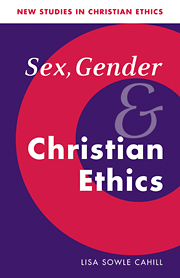Book contents
- Frontmatter
- Contents
- General editor's preface
- Acknowledgments
- 1 Sex, gender, and the problem of moral argument
- 2 Feminism and foundations
- 3 Particular experiences, shared goods
- 4 “The body” – in context
- An interlude and a proposal
- 5 Sex, gender, and early Christianity
- 6 Sex, marriage, and family in Christian tradition
- 7 The new birth technologies and public moral argument
- Concluding reflections
- Notes
- Index
- New Studies in Christian Ethics
2 - Feminism and foundations
Published online by Cambridge University Press: 05 June 2012
- Frontmatter
- Contents
- General editor's preface
- Acknowledgments
- 1 Sex, gender, and the problem of moral argument
- 2 Feminism and foundations
- 3 Particular experiences, shared goods
- 4 “The body” – in context
- An interlude and a proposal
- 5 Sex, gender, and early Christianity
- 6 Sex, marriage, and family in Christian tradition
- 7 The new birth technologies and public moral argument
- Concluding reflections
- Notes
- Index
- New Studies in Christian Ethics
Summary
Sex and gender are “foundational” questions for contemporary Christian ethics. In accusing Christian authority of perpetrating the illegitimate hegemony of negative, distorted, repressive, or truncated views of human sexuality and of women, critics today often imply a wider deconstruction of Christian ethics, and indeed a distrust of any ethics which assumes its own objectivity or universal relevance. Thus, sex and gender controversy exposes the cracks in Christian morality's epistemological foundations.
Too many thinkers have replied to the anti-foundationalist challenge with a communitarian, even relativist, depiction of morality that abdicates the case for any broad intelligibility of Christian views of right and wrong. Most such critics aim primarily at Kantian theories insofar as they are formal and abstract, and are oriented toward universal absolute principles. In this chapter, I shall develop examples of intentional nonfoundationalism in ethics, including its influence on Christian thought, and shall suggest that it is ethically inadequate. It defines the “foundations” it rejects too narrowly, and therefore can rebut only some understandings of moral objectivity and universality. In the following chapter, I shall move to an alternative – a critical realism more akin to Aristotle and Thomas Aquinas than to Kant.
The epistemological flaws in traditional Christian ideas about sex and gender have come to light because of broad shifts in philosophical paradigms of reality, truth, and knowledge. The communitarian and hierarchically ordered worldview of the medieval period gave way to Enlightenment rationalism and humanism; and counteractions to Enlightenment rationality and capitalism – especially Marxism, critical theory, and postmodernism – have been formative of feminist and other socially transformative movements.
- Type
- Chapter
- Information
- Sex, Gender, and Christian Ethics , pp. 14 - 45Publisher: Cambridge University PressPrint publication year: 1996



